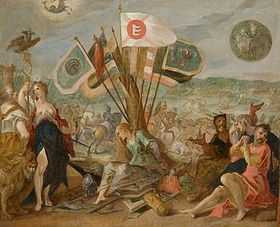Sigismund Báthory
| Sigismund Báthory | |
|---|---|
 | |
| Born |
Zsigmond Báthory March 20, 1572 Nagyvárad (today Oradea) |
| Died |
March 27, 1613 (aged 41)[1] Libochovice |
| Nationality | Hungarian |
| Ethnicity | Hungarian |
| Religion | Roman Catholic |
| Spouse(s) | Archduchess Maria Christina of Austria (1574-1621) |
Sigismund Báthory (Hungarian: Báthory Zsigmond, Romanian: Sigismund Bathory) (1572 – March 27, 1613) was Prince of Transylvania.
Biography

Hailing from the Báthory family's Somlyó branch, he was the son of Christopher Báthory, Voievod of Transylvania, and nephew of Stephen Báthory, King of Poland. He was elected prince in his father's lifetime, but being quite young at his father's death, the government was entrusted to a regency.[2]
In 1588 he attained his majority, and joined the league of Christian Princes against the Turks. The obvious danger of such a course caused no small anxiety in the principality, and the diet of Torda (today: Turda, Romania) even went so far as to demand a fresh coronation oath from Sigismund. Upon his refusal to render it, the council members threatened him with deposition. Ultimately Báthory got the better of his opponents, and executed all whom he got into his hands (1595).[3]
In 1595, at Gyulafehérvár (today Alba Iulia), Sigismund Báthory signed a treaty with Michael the Brave, the Voivod of Wallachia, in which Wallachia came under sovereignty of Transylvania, requiring Sigismund to send Michael the Brave an aid for fighting the Ottomans.
On August 13, 1595 at the Battle of Călugăreni near the Neajlov river, Michael defeated a Turkish army led by Sinan Pasha. Despite the victory Michael, having too few troops to continue the war, retreated toward Transylvania. Joining Sigismund Báthory's 40,000-strong army led by István Bocskay, they liberated Târgovişte (October 8, 1595), Bucharest (October 12, 1595) and Brăila. Wallachia was liberated on October 29, 1595.
The turning-point of his career was his separation from his wife, Archduchess Maria Christina of Austria (1574-1621) (daughter of Archduke Charles II of Inner Austria), in 1599, an event followed by his own abdication the same year. It was on this occasion that he offered the throne of Transylvania to Rudolph II, Holy Roman Emperor and King of Hungary, in exchange for the duchy of Opole in Silesia. As Duke of Opole he also was a Prince of the Holy Roman Empire.[4]
In April 1598 Sigismund resigned as Prince of Transylvania in favor of Emperor Rudolf, reversed his decision in October 1598, and then resigned again in favor of Cardinal Andrew Báthory, his cousin. This allowed Transylvania to fall under the influence of the King of Poland. Michael the Brave reestablished an alliance with Emperor Rudolf, began a campaign against Andrew on October 5, 1599, and became Prince of Transylvania in November 1599, while the Habsburg general Giorgio Basta entered Transylvania from the west at the same time.
In 1600, however, Sigismund at the head of an army of Poles and Cossacks, attempted to recover his throne again, but was routed by Michael the Brave, voivode of Moldavia and Wallachia, at Suceava. In February 1601 the diet of Kolozsvár (today: Cluj-Napoca, Romania) reinstated him, but again he was driven out, after the Battle of Goroszló, by Michael the Brave and general Giorgio Basta, never to return. He died at Prague in 1613.[4]
His reign was described by the contemporary Baranyai Decsi Janos in his chronicle link
See also
- For other nobles of the same name, please see Sigismund.
Notes
References
-
 This article incorporates text from a publication now in the public domain: Bain, Robert Nisbet (1911). "Báthory, Sigismund". In Chisholm, Hugh. Encyclopædia Britannica 3 (11th ed.). Cambridge University Press. pp. 513–514.
This article incorporates text from a publication now in the public domain: Bain, Robert Nisbet (1911). "Báthory, Sigismund". In Chisholm, Hugh. Encyclopædia Britannica 3 (11th ed.). Cambridge University Press. pp. 513–514.
External links
| Wikimedia Commons has media related to Sigismund Báthory. |
| Sigismund Báthory House of Báthory Born: 1572 Died: 27 March 1613 | ||
| Regnal titles | ||
|---|---|---|
| Preceded by Christopher Báthory |
Voivode of Transylvania 1581–1586 |
Succeeded by office abolished |
| Preceded by Stephen Báthory |
Prince of Transylvania 1586–1597 |
Succeeded by Rudolph |
| Preceded by Rudolph |
Prince of Transylvania 1598–1599 |
Succeeded by Andrew Báthory |
| Prince of Transylvania 1601 |
Succeeded by Rudolph | |
| Prince of Transylvania 1602 | ||
| Notes and references | ||
| 1. Regnal Chronologies | ||
|